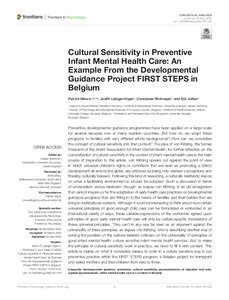| dc.date.accessioned | 2022-08-18T05:52:19Z | |
| dc.date.available | 2022-08-18T05:52:19Z | |
| dc.date.issued | 2022-05-04 | |
| dc.identifier | doi:10.17170/kobra-202208186682 | |
| dc.identifier.uri | http://hdl.handle.net/123456789/14075 | |
| dc.description.sponsorship | Gefördert durch den Publikationsfonds der Universität Kassel | |
| dc.language.iso | eng | |
| dc.rights | Namensnennung 4.0 International | * |
| dc.rights.uri | http://creativecommons.org/licenses/by/4.0/ | * |
| dc.subject | developmental guidance | eng |
| dc.subject | prevention | eng |
| dc.subject | cultural sensitivity | eng |
| dc.subject | psychodynamics of migration and exile | eng |
| dc.subject | applied psychoanalysis | eng |
| dc.subject | infant mental health care in a context of diversity | eng |
| dc.subject.ddc | 150 | |
| dc.title | Cultural Sensitivity in Preventive Infant Mental Health Care: An Example From the Developmental Guidance Project FIRST STEPS in Belgium | eng |
| dc.type | Aufsatz | |
| dcterms.abstract | Preventive developmental guidance programmes have been applied on a large scale for several decades now in many western countries. But how do we adapt these programs to families with very different ethnic backgrounds? How can we concretise the concept of cultural sensitivity into that context? The plea of von Klitzing, the former President of the World Association for Infant Mental Health, for further reflection on the concretization of cultural sensitivity in the context of infant mental health care is the main source of inspiration to this article. von Klitzing speaks out against the point of view in which universal children’s rights or conditions that are seen as promoting a child’s development all around the globe, are criticized as being only western conceptions and thereby culturally biassed. Following this kind of reasoning, a culturally relativistic stance on what a facilitating environment is, should be adopted. Such a discussion in terms of universalism versus relativism, though, as argues von Klitzing, is an old antagonism that cannot inspire us for the adaptation of early health care practices or developmental guidance programs that are fitting in to the needs of families and their babies that are living in multicultural contexts. Although it could be interesting to think about how certain universal principles of good-enough child care can be formulated or embodied in an intercultural variety of ways, these variable expressions of the worldwide agreed upon principles of good early mental health care will only be culture-specific translations of these universal principles. They can’t in any way be seen as an argument against the universality of these principles, as argues von Klitzing, who is describing another way of solving the problem of the cultural relativist criticism on the universality of principles of good infant mental health: culture sensitive infant mental health services. But, to make the principle of cultural sensitivity work in practice, we need to fill it with content. Thisnarticle is mainly on what it concretely means to work in a culture sensitive way in our preventive practice within the FIRST STEPS program, a Belgian project for immigrant and exiled mothers and their children from zero to three. | eng |
| dcterms.accessRights | open access | |
| dcterms.creator | Meurs, Patrick | |
| dcterms.creator | Lebiger-Vogel, Judith | |
| dcterms.creator | Rickmeyer, Constanze | |
| dcterms.creator | Julian, Gül | |
| dc.relation.doi | doi:10.3389/fpsyg-2022.831416 | |
| dc.subject.swd | Belgien | ger |
| dc.subject.swd | Gesundheit | ger |
| dc.subject.swd | Gesundheitsfürsorge | ger |
| dc.subject.swd | Prävention | ger |
| dc.subject.swd | Kind | ger |
| dc.subject.swd | Sensitivität | ger |
| dc.type.version | publishedVersion | |
| dcterms.source.identifier | eissn:1664-1078 | |
| dcterms.source.journal | Frontiers in Psychology | eng |
| dcterms.source.volume | Volume 13 | |
| kup.iskup | false | |
| dcterms.source.articlenumber | Article 831416 | |


